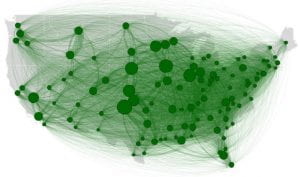Focus
Research on the integrated biophysical, socioeconomic, policy, and institutional impacts of new and existing renewable energy technologies, and the tradeoffs, co-benefits, and synergies of alternative technology pathways.
Highlights
- Penn State is an international leader in many of the disciplinary aspects of sustainability assessment such as: complex systems modeling; computable general equilibrium modeling; supply chain analysis; advanced visualizations and immersive technologies; life cycle analysis; political-industrial ecology; socio-ecological systems; and decision-making under uncertainty.
- Despite Penn State’s robust interdisciplinary research portfolio, there is a lack of cohesive and sustained training opportunities for systems assessment modeling and decision making in work related to clean technologies, such as renewable energy sources.
Goals
- Establish a new resource/training center for sustainability modeling, data science, and systems assessment related to renewable energy.
- Increase capacity for sustainability assessment-guided research through strategic investment in training for research teams investigating renewable energy pathways, including energy production, storage, and conversion.
Overview

Faculty across Penn State use several different strategies and tools to model complex systems and inform decision making, many which can be applied to the analysis of renewable energy systems, and their interaction with other commodity flows, such as food and water resources (Fig. 1).
A large number of sustainability assessment tools have been developed to assist scientists, decision makers, engineers, and designers with analyzing the environmental impacts and tradeoffs of their products and services (ex., energy production and storage), and the role of regulation and market distortions in ameliorating these trade-offs, including:
- Life cycle analysis, footprint methods, and environmentally-coupled economic analysis;
- Integrated assessment models;
- Resilience and vulnerability toolkits; and
- Approaches for decision making under deep uncertainty.
Many of these methodologies suffer greatly from data synthesis issues (i.e., combining data from many different sources), rely on strong assumptions regarding the behavior of economic agents, and are not well integrated with other disciplinary approaches; hence, there are many opportunities for improvement and innovation within the sustainability assessment field. Although a variety of Penn State faculty teams conduct research on these different approaches for sustainability assessment in their areas of interest, few perform LCA modeling, partially due to a lack of available training resources and their interest in using open source software and data to support research reproducibility. However, LCA is particularly useful for assessing the environmental impacts of a product or service through all stages of its life cycle, including raw material acquisition, manufacturing/ production, transportation, use, and end of life. Results from LCA approaches are typically reported in terms of the following impact categories:
- Global warming potential;
- Eutrophication potential;
- Water depletion potential;
- Human health impact; and
- Land use impact.
Sensitivity analyses in LCA can help indicate key modifications which can be made to reduce negative environmental impacts of a particular product or service, such as during the production, storage, and conversion of renewable energy technologies.
Current Research
Systems assessment research activities at Penn State have historically been supported by: the National Science Foundation; the U.S. Departments of Agriculture (USDA), Energy (DOE), and Transportation (DOT); as well as the Pennsylvania Department of Environmental Protection (PA DEP). Current research activities related to renewable energy include:
- Quantifying tradeoffs between water, food, and energy consumption across the United States through tracking commodity flows from origin to point of consumption;
- Analyzing systems optimization strategies for growing crops at watershed scales;
- Analyzing life cycle and techno-economic impacts of biofuel feedstock production and processing;
- Examining the non-linearities and uncertainty of sustainability assessment, accounting for coupled uncertainty across economic and environmental systems;
- Understanding the critical importance of alternative public-policy and regulatory regimes on sustainability assessment.
Strategic Planning
A new Center for Sustainability Assessment is proposed to support this effort, ideally administered under the Institutes of Energy and the Environment (IEE) to enable broad, cross-college collaboration. While the center would support the training and computational needs of sustainability assessment modeling for renewable energy systems, it could expand to serve as a resource for sustainability assessment research and development for other applications across the university. The overall mission of the Center would be to:
- Enhance and coordinate research on the formulation, empirical validation, and implementation of new sustainability assessment methods.
- Identify needs for linking sustainability assessment across spatial, temporal, and jurisdictional scales, from local energy production to global supply chains and impacts, spanning decades into the future, and reflecting adjustments across multiple layers of decision-making and regulatory distortions.
- Support data and computational needs required for performing comprehensive sustainability assessment.
To enhance activities in this area, it is proposed that Penn State:
- Hire faculty and post-docs with systems assessment expertise (ex., Industrial Ecology position in ABE)
- Develop new courses (with summer salary support): 200-level GEN ED course on systems assessment modeling and decision making; 400-level course on Industrial Ecology.
- Offer a ~3-wk summer training course on LCA (start by bringing in external training group, which we can then adapt/adopt).
- Provide online training opportunities for students and researchers.
- Coordinate an external speaker seminar series on sustainability assessment (hosted and organized by IEE or other staff).
List of Participants
- Primary contact
- Rachel Brennan, 231-K Sackett (rab44@psu.edu)
- Participants
- Jennifer Baka
- Seth Blumsack
- Rachel Brennan
- Caitlin Grady
- Joel Landry
- Alfonso Mejia
Education and Outreach
- Online courses
- EME 504, Foundations in Sustainability Systems
- EME 805, Renewable Energy and Non-Market Enterprise
- EME 807, Technologies for Sustainability Systems
- Outreach activities
- Energy Days
